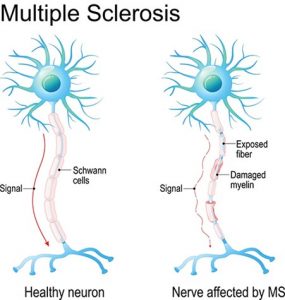Multiple Sclerosis (MS) causes the loss of myelin which insulates the nerve and causes signals from the brain to the spinal cord to the muscles to be slowed, blocked, or altered. Due to this, muscle weakness is highly common occurring either unilaterally (one side of the body: more common) or bilaterally (both sides of the body: less common). Exacerbation of weakness can incur from the time of day, body temperature, prolonged walking/ exercise, and prolonged sedentary behaviour which causes what is called secondary weakness.
Exercise for MS is highly important to prevent or reverse effects of secondary weakness and aid in the management or improvement of function in individuals with MS. Specifically, improvements to:
- Activities of daily living
- Quality of life
- Pain/ fatigue
- Balance and mobility
- Progression of disability
- Arthritis
- Osteoporosis
- Depression and mood
- Heart disease
- Sleep
There are many forms of exercise that can be completed such as, balance, strength training/ resistance training, aerobic exercise/ fitness training, aquatic exercise (under supervision and appropriate conditions!), stretching, tai chi, and yoga. It is important to know that exercise does not trigger or cause exacerbations or relapses in MS!
What to consider when beginning/ completing exercise
-Time of day can highly influence muscle fatigue and energy levels. Exercise should always be scheduled around times and days where the individual feels the most energised and least fatigued.
-Temperature/ heat intolerance could be within a gym setting or within a pool based setting. Hot and cold temperatures can elicit different responses to an individual primarily causing increased pain sensitivity and muscle weakness. This also ties in within the time of day (mornings and nights are colder, middle of the day is warmer)
-Spasticity of hands or feet should be highly considered for client safety. To reduce the risk associated with hand and foot spasticity, hand/ foot straps could be incorporated when using equipment safe for the individual as well as utilising machines instead free weights.
-Motor control/ coordination can be altered/ decreased due to the myelin loss and decreased control of muscle movement
-Balance is affected due to many pathophysiological symptoms experienced with MS, primarily the loss of control and regulation of nerve innervation (muscle control) and sensation (blocked nerves) which may be felt in the lower extremities.
-Urinary incontinence is common with individuals with MS due to lack of control around the groin and girdle region. This should be accounted for by having quick access to toilets facilities within your exercise space.




